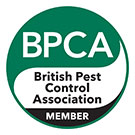GOT PEST PROBLEMS, GET IN TOUCH FOR A FREE QUOTE
- Telephone0141 432 0433
- Emailinfo@allpestservices.co.uk
- REQUEST A CALLBACK
There are over 4000 species of cockroach worldwide but only 3 are commonly found in the UK. They are vectors of many diseases including Campylobacter (food poisoning), E-Coli (Intestinal and urinary tract infection), Pseudomonas aeruginosa (lesions and urinary tract infection), Salmonella (Enteric Fever, gastroenteritis and Typhoid fever), Shigella (Dysentery), Staphylococcus spp (boils, abscesses) and leprosy.
Develop by incomplete metamorphosis, shedding skins as they grow. Cockroaches are omnivorous eating almost any organic matter including human waste and even paper.
The German Cockroach [Blatella germanica] prefers a warm humid environment and is often attracted to the motor housings of machines, fridges etc. It is a superb climber, able to climb glass easily and is often found at high levels as a result.
Adults are 12-15mm long with prominent antennae. Females lay their eggs in an ootheca (egg case) which they normally carry until just prior to hatching. Each ootheca contains 30-40 eggs. Approx 4-8 oothecae are produced in a females lifetime. Eggs hatch in circa 17 days at 30 Celsius.
The Oriental Cockroach [Blatta orientalis] is widely distributed in the UK and can tolerate lower temperatures than the German Cockroach, sometimes even being found living in drains outside. Nevertheless it prefers heated buildings often in wall cavities, cable trunking and crevices to floors and walls. The insect rapidly loses the ability to climb as they grow.
Adults are 17-30mm long with prominent antennae. Females lay their eggs in an ootheca (egg case) which they deposit in crevices and cover over with any available material. Each ootheca contains approx 16 eggs. Approx 5-10 oothecae are produced in a females lifetime. Eggs hatch in 45-80 days at 20 Celsius.
The American Cockroach [Periplaneta americana] is far less common in the UK, 25-40mm long with prominent redish-brown markings on the central thorax with paler markins to the edges.
Often brought into the UK on ships and found in warm animal housing such as in zoos and botanic gardens. Adults are 25-40mm long with prominent antennae.
Females lay their eggs in an ootheca (egg case) which they often carry for several weeks until eggs are fully developed just prior to hatching. Each ootheca contains approx 14-28 eggs. Approx 30 oothecae are produced in a females lifetime. Eggs hatch in 25-40 days at 30 Celsius.
Do you have a problem with cockroaches? We can help…
All Pest Services is a member of the British Pest Control Association (BPCA) and the National Pest Technician’s Association (NPTA), as well as being an approved member of the Confederation of European Pest Control Associations (CEPA). We are also Safe Contractor Approved.
Our staff have been specifically trained to undertake all types of insect control work and have many years’ experience in the profession. All our staff have achieved the Royal Society for Public Health Level 2 Award in Pest Management which is a requirement for members of the BPCA. All our staff also have specific qualifications in Insect Control and the Safe Use of Pesticides.
Although many pest species can be relatively easily controlled the key is correct identification. Incorrect identification of the pest species or extent of infestation are the most common reasons for failure. For this reason All Pest Services offer a bespoke service for most types of insect control. The first thing is to give us a call to discuss the problem. Some issues can be resolved without the need for treatment. Alternatively we can carry out a site survey to ensure the problem is correctly identified and efficiently dealt with.
All Pest Services is a member of the British Pest Control Association (BPCA) and the National Pest Technician’s Association (NPTA), as well as being an approved member of the Confederation of European Pest Control Associations (CEPA). We are also Safe Contractor Approved.
Our staff have been specifically trained to undertake all types of insect control work and have many years’ experience in the profession. All our staff have achieved the Royal Society for Public Health Level 2 Award in Pest Management which is a requirement for members of the BPCA. All our staff also have specific qualifications in Insect Control and the Safe Use of Pesticides.
Although many pest species can be relatively easily controlled the key is correct identification. Incorrect identification of the pest species or extent of infestation are the most common reasons for failure. For this reason All Pest Services offer a bespoke service for most types of insect control. The first thing is to give us a call to discuss the problem. Some issues can be resolved without the need for treatment. Alternatively we can carry out a site survey to ensure the problem is correctly identified and efficiently dealt with.
Although most insects do not cause us problems and many are benign or even beneficial even in our homes there are other insects that can cause problems. These may need controlling for reasons such as preventing the spread of disease, preventing damage to livestock and crops or property, preserving public health or public or safety. Some insects can bite or sting (such as Fleas, Bed Bugs or wasps) while others spread disease such as cockroaches which can spread diseases such as Staphylococcus spp., E Coli, Shigella spp., Salmonella spp. Other insects are significant because of their role in damaging or contaminating foodstuffs, such as Grain Weevil, Flour Beetle, Grain and Flour Moths etc.
Causing harm to any species, whether insect or otherwise, is a last resort. Some species, such as flies and night moths can be effectively controlled using Fly Screen Doors and Windows or the installation of Electric Fly Control Units. Others can be effectively managed by removing their food source. In many cases however a pesticide will be needed. All Pest Services can advise on the installation of Fly Screens and Fly Control Units as well as the safest and most appropriate pesticides where necessary.
This is a complex area and is governed by a wide range of legislation including the Food and Environment Protection Act 1985 Part 3 [FEPA], the Control of Pesticide Regulations 1986 [COPR], the Wildlife and Countryside Act 1981, the Control of Substances Hazardous to Health Regulations [COSHH], amongst others. If you’re unsure seek advice from a reputable pest control company like All Pest Services. Certain species such as honey bees, while not specifically protected, are becoming increasingly endangered and should not be destroyed apart from in extreme situations. In many cases a bee keeper will be able to remove them without causing any harm if it is absolutely necessary. Specific measures must be followed if control measures are required – please seek advice before you act!
GOT PEST PROBLEMS, GET IN TOUCH FOR A FREE QUOTE










